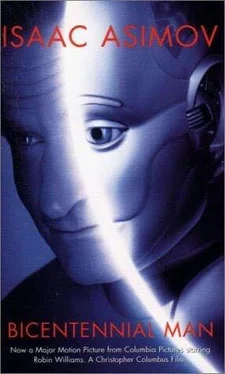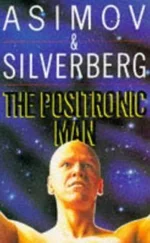They stared at each other for a moment and then Janek touched a contact at his desk.
He said, “Added precaution. No one can overhear us now by any means. Mr. Edwards, do you realize the danger of that statement? To yourself? You must not overestimate the power of the Global Charter. A government has the right to take reasonable measures for the protection of its stability.”
Edwards said, “I’m approaching you, Mr. Janek, as someone I presume to be a loyal American citizen. I come to you with news of a terrible crime that affects all Americans and the entire Federation. A crime that has produced a situation that perhaps only you can right. Why do you respond with threats?”
Janek said, “That’s the second time you have tried to make it appear that I am a potential savior of the world. I can’t conceive of myself in that role. You understand, I hope, that I have no unusual powers.”
“You are the secretary to the President.”
“That does not mean I have special access to him or am in some intimately confidential relationship to him. There are times, Mr. Edwards, when I suspect others consider me to be nothing more than a flunky, and there are even times when I find myself in danger of agreeing with them.”
“Nevertheless, you see him frequently, you see him informally, you see him—”
Janek said impatiently, “I see enough of him to be able to assure you that the President would not order the destruction of that mechanical device on Tercentenary day.”
“Is it in your opinion impossible, then?”
“I did not say that. I said he would not. After all, why should he? Why should the President want to destroy a look-alike android that had been a valuable adjunct to him for over three years of his Presidency? And if for some reason he wanted it done, why on Earth should he do it in so incredibly public a way—at the Tercentenary, no less—thus advertising its existence, risking public revulsion at the thought of shaking hands with a mechanical device, to say nothing of the diplomatic repercussions of having had representatives of other parts of the Federation treat with one? He might, instead, simply have ordered it disassembled in private. No one but a few highly placed members of the Administration would have known.”
“There have not, however, been any undesirable consequences for the President as a result of the Incident, have there?”
“He has had to cut down on ceremony. He is no longer as accessible as he once was.”
“As the robot once was.”
“Well,” said Janek uneasily. “Yes, I suppose that’s right.”
Edwards said, “And, as a matter of fact, the President was re-elected and his popularity has not diminished even though the destruction was public. The argument against public destruction is not as powerful as you make it sound.”
“But the re-election came about despite the Incident. It was brought about by the President’s quick action in stepping forward and delivering what you will have to admit was one of the great speeches of American history. It was an absolutely amazing performance; you will have to admit that.”
“It was a beautifully staged drama. The President, one might think, would have counted on that.”
Janek sat back in his chair. “If I understand you, Edwards, you are suggesting an involuted storybook plot. Are you trying to say that the President had the device destroyed, just as it was—in the middle of a crowd, at precisely the time of the Tercentenary celebration, with the world watching—so that he could win the admiration of all by his quick action? Are you suggesting that he arranged it all so that he could establish himself as a man of unexpected vigor and strength under extremely dramatic circumstances and thus turn a losing campaign into a winning one? . . . Mr. Edwards, you’ve been reading fairy tales.”
Edwards said, “If I were trying to claim all this, it would indeed be a fairy tale, but I am not. I never suggested that the President ordered the killing of the robot. I merely asked if you thought it were possible and you have stated quite strongly that it wasn’t. I’m glad you did, because I agree with you.”
“Then what is all this? I’m beginning to think you’re wasting my time.”
“Another moment, please. Have you ever asked yourself why the job couldn’t have been done with a laser beam, with a field deactivator—with a sledgehammer, for God’s sake? Why should anyone go to the incredible trouble of getting a weapon guarded by the strongest possible government security to do a job that didn’t require such a weapon? Aside from the difficulty of getting it, why risk revealing the existence of a disintegrator to the rest of the world?”
“This whole business of a disintegrator is just a theory of yours.”
“The robot disappeared completely before my eyes. I was watching. I rely on no secondhand evidence for that. It doesn’t matter what you call the weapon; whatever name you give it, it had the effect of taking the robot apart atom by atom and scattering all those atoms irretrievably. Why should this be done? It was tremendous overkill.”
“I don’t know what was in the mind of the perpetrator.”
“No? Yet it seems to me that there is only one logical reason for a complete powdering when something much simpler would have carried through the destruction. The powdering left no trace behind of the destroyed object. It left nothing to indicate what it had been, whether robot or anything else.”
Janek said, “But there is no question of what it was.”
“Isn’t there? I said only the President could have arranged for a disintegrator to be obtained and used. But, considering the existence of a look-alike robot, which President did the arranging?”
Janek said harshly, “I don’t think we can carry on this conversation. You are mad.”
Edwards said, “Think it through. For God’s sake, think it through. The President did not destroy the robot. Your arguments there are convincing. What happened was that the robot destroyed the President. President Winkler was killed in the crowd on July 4, 2076. A robot resembling President Winkler then gave the Tercentenary speech, ran for re-election, was re-elected, and still serves as President of the United States!”
“Madness!”
“I’ve come to you, to you because you can prove this—and correct it, too.”
“It is simply not so. The President is—the President.” Janek made as though to rise and conclude the interview.
“You yourself say he’s changed,” said Edwards quickly and urgently. “The Tercentenary speech was beyond the powers of the old Winkler. Haven’t you been yourself amazed at the accomplishments of the last two years? Truthfully—could the Winkler of the first term have done all this?”
“Yes, he could have, because the President of the second term is the President of the first term.”
“Do you deny he’s changed? I put it to you. You decide and I’ll abide by your decision.”
“He’s risen to meet the challenge, that is all. It’s happened before this in American history.” But Janek sank back into his seat. He looked uneasy.
“He doesn’t drink,” said Edwards.
“He never did—very much.”
“He no longer womanizes. Do you deny he did so in the past?”
“A President is a man. For the last two years, however, he’s felt dedicated to the matter of the Federation.”
“It’s a change for the better, I admit,” said Edwards, “but it’s a change. Of course, if he had a woman, the masquerade could not be carried on, could it?”
Janek said, “Too bad he doesn’t have a wife.” He pronounced the archaic word a little self-consciously. “The whole matter wouldn’t arise if he did.”
“The fact that he doesn’t made the plot more practical. Yet he has fathered two children. I don’t believe they have been in the White House, either one of them, since the Tercentenary.”
Читать дальше












